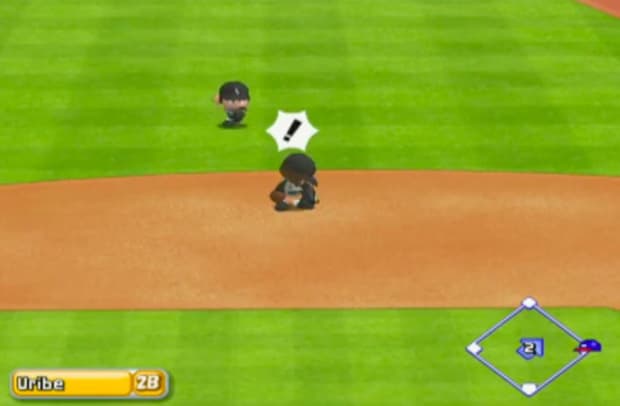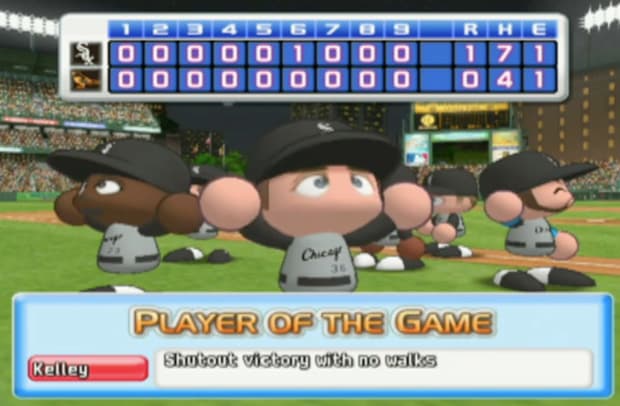The early part of Jared Kelley's career, according to a Wii game
In the second round this year, the White Sox had arguably the biggest steal of the draft in righthander Jared Kelley. Somehow, the South Siders snagged him with the 47th overall pick, though MLB Pipeline ranked Kelley as the No. 12 overall draft prospect, and ESPN ranked him at No. 7.
Given the franchise's history with second round picks, the selection of Kelley is perhaps even more noteworthy to White Sox fans than it would be to fans of other teams. According to Baseball-Reference, the White Sox have had a grand total of one second round pick accumulate more than 10 wins above replacement with the team (Terry Forster, drafted in 1970, accumulated 12.0 WAR for the White Sox).
Can Kelley become the most valuable second round draft pick in franchise history? I looked into the crystal ball (editor's note: MLB Power Pros 2008 for the Wii) to find out.
First, a brief overview of Success Mode in MLB Power Pros 2008. The player creates a minor leaguer and tries to increase their abilities as much as possible. Ability increases make it easier for the minor leaguer to impress managers to get regular playing time. This makes it easier for the player to gain respect from scouts and get recommendations to be promoted to the majors. The minor league process lasts two seasons (one in Double-A and one in Triple-A, as the lower levels get skipped in this story). If the player advances through the Triple-A season with a high enough scout's evaluation, he will be promoted to the majors (no service time manipulation, what a crazy concept).
Most abilities are ranked on a scale from A-G, with "A" being excellent, "G" being appalling, and "D" being about average. Breaking balls are ranked on a scale from 1-7, with 2 being a pitch with about average movement (7 is practically impossible). I tried to make this player as realistic as possible (mid-90s top speed, 4 changeup rating, 2 slider rating, for starters).
Anyways, here is how Kelley did in the minors:
| League | IP | ER | K |
|---|---|---|---|
Double-A | 6.2 | 0 | 4 |
Double-A | 5.1 | 1 | 1 |
Double-A | 5.0 | 3 | 2 |
Double-A | 4.1 | 0 | 7 |
Double-A | 3.1 | 1 | 3 |
Triple-A | 8.1 | 1 | 3 |
Triple-A | 9.0 | 0 | 7 |
Triple-A | 5.2 | 3 | 0 |
Triple-A | 7.2 | 2 | 7 |
So, at the end of it, Kelley boasted a 1.79 ERA across the minor leagues. You might be wondering why I did not include BB and HR columns (the other two true outcomes), and well, neither was used much. Across 55 ⅓ innings, Kelley allowed one home run and issued two walks (admittedly, walks are rather uncommon in this game). So, despite a disappointing 5.53 K/9 rate, Kelley's FIP was still excellent, at 2.33 (based on the 2019 formula at FanGraphs).
From a health perspective, Kelley managed to stay healthy a vast majority of the time. The only hiccup was a minor injury during his time in Triple-A. Health is something that cannot be taken for granted when it comes to pitchers, so across the board, if Kelley's minor league career goes anything like this, White Sox fans should be happy.
I also went ahead and simulated the first two months of his major league career. As is the case with many rookies, things got off to a rough start. Kelley came on in relief during the season opener against Cleveland. On the very first pitch of Kelley's career, he threw a well-located changeup that resulted in an easy pop-up — which Juan Uribe dropped.
Things only got worse from there, as Uribe's error proved to be the first of many things that went wrong that inning. By the end of it, Kelley only recorded one out, and he allowed four runs. Not the finest start.
Things did get better, though. For some reason, the manager decided to make Kelley a starter despite his early struggles in the bullpen, but this proved to be a great decision. Heading into a mid-April matchup in Baltimore, Kelley was sporting a 5.51 ERA, when he had the finest performance of his young career, including his time in the minors.
As of June 6 of his rookie season, Kelley has a solid ERA of 3.68. That would put him behind only Lucas Giolito among 2019 White Sox starters, and it would put him miles ahead of everyone else in that rotation.
It is still early, but no matter how you slice it, this is a start to a career that would be exciting to follow for White Sox fans. It would also be something that we have not seen in far too long from a second round draft pick. Here's to hoping real life will have some similarities to this simulation!

